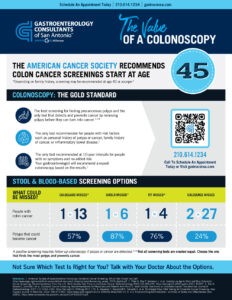The Value of a Colonoscopy
Colon cancer is one of the most preventable cancers. Unfortunately, many people delay screening because they don’t like the idea of a colonoscopy. Understanding the value of a colonoscopy can help make scheduling one easier.
A colonoscopy remains the most reliable way to find and remove precancerous polyps before they turn into cancer. For many adults, it is the single most important step they can take to protect their long-term health.
According to the American Cancer Society, screening should begin at age 45 for people at average risk. Those with a family history of colon cancer or polyps may need to begin even earlier. When screening starts on time, small problems can be found early, when they are easier to treat.
Why Colonoscopy Is the Gold Standard
A colonoscopy remains the gold standard because it is the only screening test that both detects and removes polyps during the same visit. This means it not only finds potential cancer but also prevents it. Other options may identify signs of cancer, but they can also miss it entirely. This highlights the value of a colonoscopy, since it’s the only test reliable enough to identify cancer early and prevent it altogether.
A colonoscopy is also the recommended test for people with higher risk factors, such as:
- A personal or family history of colon cancer or polyps
- A history of inflammatory bowel disease
- Certain genetic conditions that raise cancer risk
For people without symptoms or known risks, a normal colonoscopy often means the next one is not needed for ten years. Your doctor will recommend the safest interval based on your results.
Colonoscopy Alternatives
Several non-invasive screening tests are available, including stool tests and blood tests. These can be helpful for some people, but they are not as reliable as a colonoscopy.
In fact, the following tests can miss people with colon cancer. That means their test was negative for colon cancer, but they actually have it.
Here’s how many people with colon cancer the following tests missed:
- Cologuard (stool test) missed 1 in 13 people.
- Shield (blood test) missed in 1 in 6 people.
- FIT (stool test) missed 1 in 4 people.
- Colosense (stool test) missed 2 in 27 people.
In order for cancer to be prevented, polyps need to be found and removed before they can turn into cancer. These tests can miss polyps much more often than a colonoscopy.
- Cologuard missed 57% of polyps that could become cancer
- Shield missed 87% of polyps that could become cancer
- FIT missed 76% of polyps that could become cancer
- Colosense missed 24% of polyps that could become cancer
Because these tests cannot remove polyps, they are not designed to prevent cancer. This difference shows another part of the value of a colonoscopy. It allows doctors to immediately remove growths before they have a chance to become cancerous.

It’s important to note that if any of these tests come back positive, a colonoscopy will be required to identify if polyps or cancer are actually present.
The Value of a Colonoscopy
Colon cancer often develops without symptoms. Most early cancers and precancerous polyps are found in people who have not had any issues at all. While alternative tests are useful in some situations, most people benefit the most from a colonoscopy. It’s the best way to ensure that cancer is found early or prevented entirely.
If you are nearing age 45 or are at a higher risk, now is the time to schedule your colonoscopy appointment. Our expert gastroenterologists perform colonoscopies in several convenient locations across San Antonio.
Request Appointment
Related:



